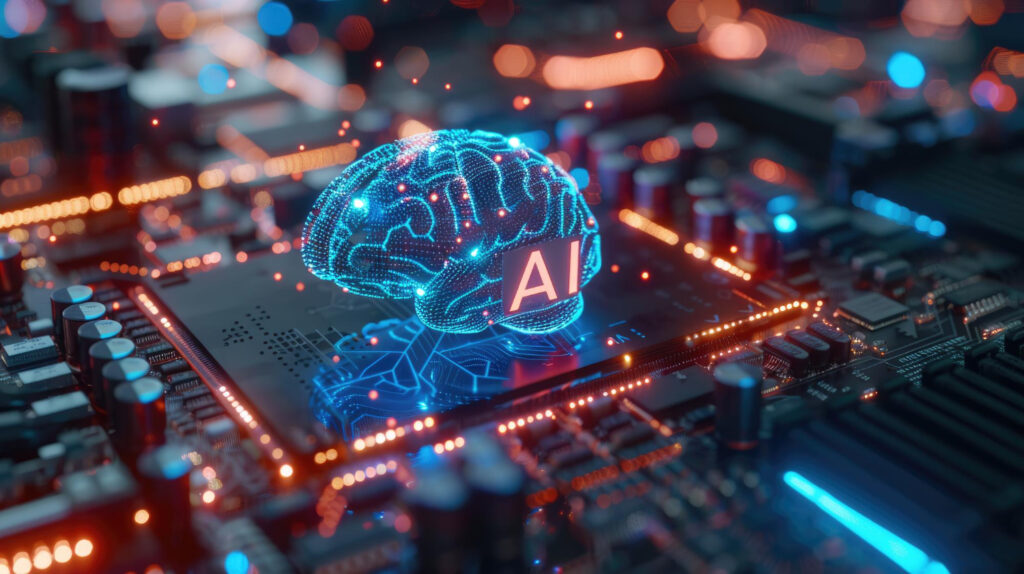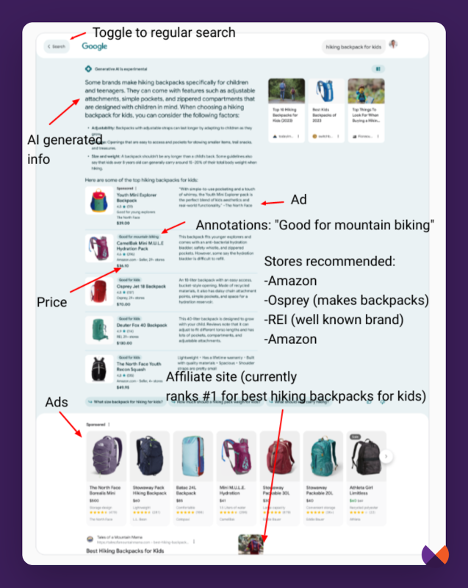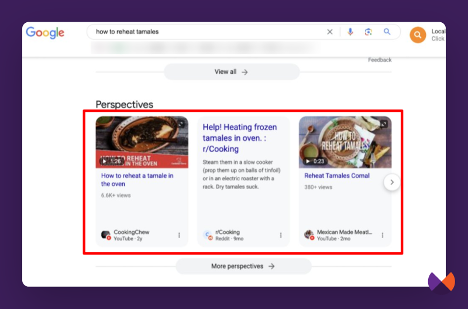
This excerpt is from “SEO in the Gemini Era” by Marie Haynes ©2024, reproduced with permission from Marie Haynes Consulting Inc.
Significant changes related to AI are on the horizon that all SEOs should be aware of. Search Generative Experience (SGE), now renamed AI Overviews, and Gemini are already transforming how people access information.
According to Google DeepMind’s creator Demis Hassabis, Google is on track to achieve their goal of developing artificial general intelligence (AGI) within the next decade.
I trust Demis, and I am excited about this future.
Let’s discuss the immediate changes to the search landscape that every website owner should be aware of.
This is a general overview, as many of these features and key points are rapidly evolving. Much of this information might be outdated by the time you read this book!
Google’s Search Generative Experience/AI Overviews
Google’s CEO, Sundar Pichai, has stated that SGE represents the future of Search.

Initially available as an opt-in experiment at labs.google.com, SGE is now integrated into Search in some countries under its new name, AI Overviews. These overviews can include various components or a combination of them, such as:
An AI-generated answer that consolidates information from multiple websites, similar to an extensive featured snippet.
Carousels Of Websites
I have been referring to these as “helpful content carousels” because they typically include the type of content we’ve discussed throughout this book. Recently, I’ve heard them called “link cards.”
(I still prefer helpful content carousels!)

These carousels are showing up in regular searches as well as in Google Assistant responses. You might also see similar carousels labeled as “Perspectives,” “Forum Discussions,” and other categories throughout search results.
These features will continue to evolve. Google is constantly learning from each search whether users find AI Overviews helpful and will keep improving them over time.
Google Gemini (Formerly Bard)
Google’s product naming can be quite confusing! Throughout this book, I’ve alternated between calling it Bard and Gemini. This is because Bard was renamed to Gemini in early 2024.
Gemini is also the name of the language model behind the system. Essentially, Gemini represents all AI at Google.
While Gemini the chatbot is not a search engine, people will likely use it as one to gather information. As it continues to improve, it becomes increasingly helpful.
Gemini will integrate with Google Assistant, available via quick touch or voice command on most phones, and can pop up over other apps.
It improves continuously through a process called reinforcement learning. If you found Bard unhelpful and stopped using it, I encourage you to try Gemini.
Consider signing up for the most advanced publicly available version, Gemini Advanced, which Google currently offers with a two-month trial.
Since the upgrade from Bard to Gemini, I have been thoroughly impressed with its rapid improvement—it seems to get better daily.
In February 2024, Google quietly announced an upgrade to Gemini called Gemini 1.5, featuring a new architecture based on a Mixture of Experts (MoE) model.
While MoE models are not new, DeepMind claims their version for Gemini is a novel iteration. The changes made Gemini significantly more efficient, accurate, and better at understanding the data it trains on.
Gemini 1.5 greatly enhances Google’s AI capabilities and provides a framework for continued rapid improvement.
If you read only one thing about Gemini, make it Google’s blog post titled “Assistant with Bard: A Step Toward a More Personal Assistant.”
I firmly believe that Gemini represents the future. While it might seem imperfect if you’ve encountered some hallucinations or inaccurate answers, its potential is significant.
After considering everything discussed, I hope you’ll see what I see: Gemini is set to redefine how we interact with information online.
This shift is likely to bring substantial changes. Predicting exactly how is challenging, but I believe many people will experience similar effects as I have. The more I engage with large language models (LLMs), the more I learn and expand my knowledge. This allows me to brainstorm ideas with tools like Gemini or ChatGPT, accelerating my understanding of how Search works and enhancing my skills across various tasks.
Users skilled in their fields will only improve with AI’s assistance, while those adept at leveraging AI will gain a considerable edge over those who do not.
Consider this: if you were living in 2024 without a phone, you could manage, but you’d be at a disadvantage compared to those who use technology.
I foresee a potential divide in society as AI becomes more integral. I’m excited for those at the forefront of using AI to improve the world, but what will become of those who choose to avoid it?
Fortunately, Google’s CEO has stated that this transition will unfold over the next decade, giving us some time to adapt.
Business Integration
In Google’s earnings calls, they’ve highlighted that one of Gemini’s key strengths is its potential for business integration. While we haven’t fully seen this yet, it’s expected that over time, integrating Google’s AI capabilities into businesses—and profiting from it—will become increasingly seamless.
Keep an eye on how AI is evolving within Google Ads as well. Although I haven’t covered Ads in this book, I foresee numerous future opportunities in this area.
Here’s a potential scenario: imagine a user searching for information on a recent traffic drop. They interact with Gemini, which provides general advice and recommends some relevant websites.
In the future, Google might offer paid placements like “Talk to Marie Haynes’ AI Assistant,” which would connect the user to a chatbot on my site.
This chatbot would be updated with my latest content. I would be motivated to produce high-quality, helpful material to ensure the chatbot remains valuable.
I might choose to charge for access to this chatbot or offer it for free, using it to recommend my resources and services when appropriate.
In this scenario, Google could even feature my chatbot directly in the search results.
As businesses start to monetize Google’s AI more effectively, we can expect to see rapid growth and innovation in this space!
Original news from SearchEngineJournal
